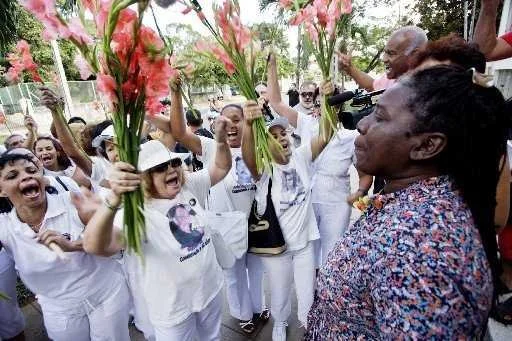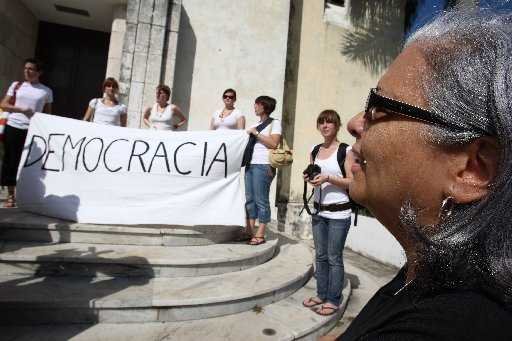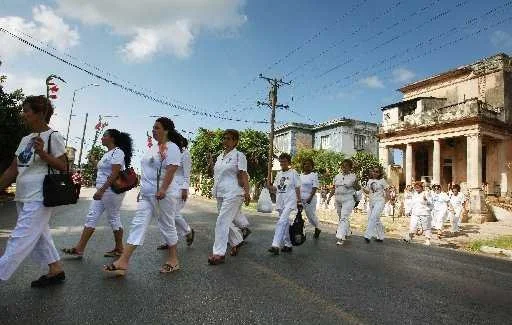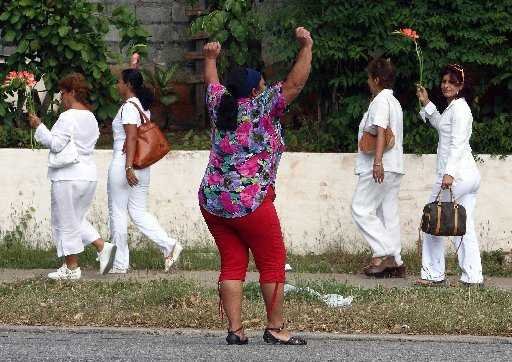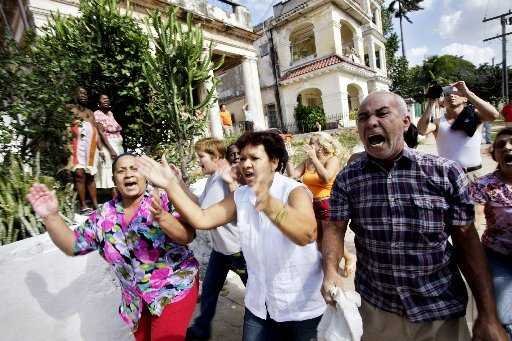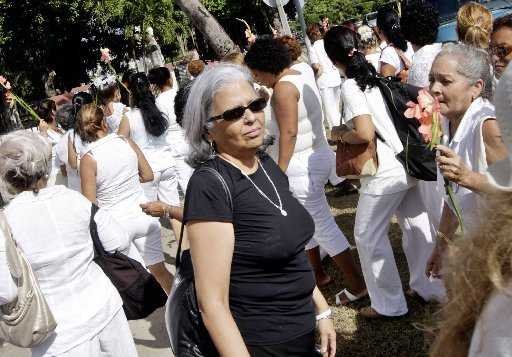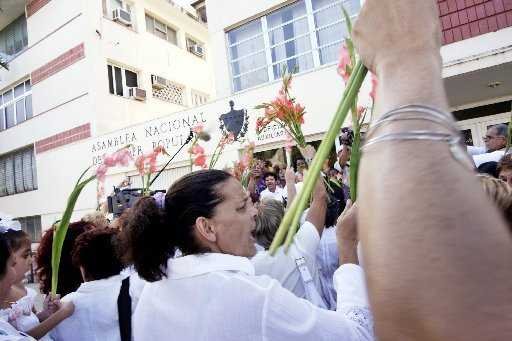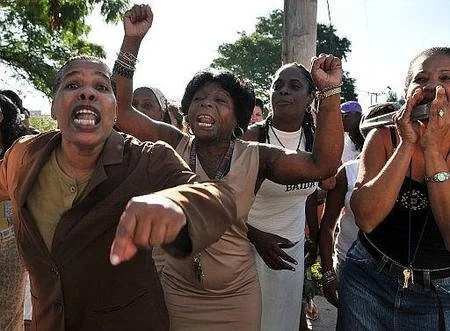CUBA'S LADIES IN WHITE 20 YEARS MARCHING FOR THE RELEASE OF ALL POLITICAL PRISONERS
We, with our own means, are doing our own thing, because they (the political prisoners of the Black Spring) are innocent," … “They have only thought different from the regime. And that doesn't give them the right to sentence them to 20, 25, 28 years in prison. It is burying these men alive. And we are not going to allow it."
Laura Pollán, founder of the Ladies in White.
An iconic photo that shows the love that the Ladies in White inspired in the Cuban people. Laura Pollan, founder of the Ladies in White gives a Gladiolus to a woman watching the Ladies' march.
Berta Soler, leader of the Ladies in White continues the peaceful struggle for the release of all political prisoners in Cuba. Sept 18, 2022
On a day like today 20 years ago in Havana, Cuba, the organization Ladies in White was created. They were founded on March 30, 2003. The organization is made up of wives, mothers, daughters and relatives of political prisoners from the Black Spring of 2003, when 75 journalists, activists and opposition members were sentenced to up to 28 years in prison for exercising fundamental human rights.
Initially, their fundamental motivation was the liberation of their loved ones imprisoned for political reasons, a cause that with time transcended to the struggle for the liberation of political prisoners and the set of repressive laws and actions that lead Cubans to prison for political reasons.
Ironically, the Ladies in White emerged under the very nose of State Security. Its members met in Villa Marista, National Headquarters of the State Security in Havana when they went to visit and meet their arbitrarily detained relatives. The Ladies became known for wearing white, a color that symbolizes the purity of their ideals. Their activism stood out for marching peacefully carrying a photo of their imprisoned family member and a gladiola in their hands.
They marched mainly on Sundays along the Fifth Avenue of Miramar in Havana towards the Church of Santa Rita where they prayed for the release of their unjustly imprisoned loved ones. The organization expanded from Havana to other provinces to become a national movement. Its founding leader Laura Pollan, a teacher by profession and wife of the prisoner of the group of 75 Hector Maceda sentenced to 20 years in jail, died in a Havana hospital on October 14, 2011 under circumstances that need clarification.
The Ladies in White won the support of the Cuban people and of democratic organizations and governments around the world. The pressure generated by the Ladies in on the Cuban regime by the marches between 2003 and 2010 was a key factor in the release of the political prisoners of the Black Spring with the mediation of the Catholic Church.
In 2005, the Ladies in White received the prestigious Sakharov Prize for Freedom of Thought, awarded by the European Parliament. In 2006, Human Rights First awarded them the Human Rights Prize in recognition of their courage in the defense of freedoms.
Likewise, Amnesty International recognized and praised the peaceful work of the Ladies in White, and declared their husbands, children and relatives as prisoners of conscience. Also, intellectuals such as Noam Chomsky, Sergio Ramírez and Tomás Eloy Martínez demanded the freedom of the political prisoners of the Black Spring.
In 2018, they received in New York City the 2018 Milton Friedman Freedom Award from the Washington-based Cato Institute for their significant contribution to the advancement of freedom.
The Ladies in White continue today their struggle for the release of more than 1,000 political prisoners unjustly imprisoned for their ideas. Today in Cuba there are approximately 130 women imprisoned for exercising human rights. Four of its members, Aymara Nieto, Saylí Navarro, Sissi Abascal and Tania Echevarría are imprisoned for exercising their right to freedom of expression.
Today the Ladies in White are prevented from marching peacefully and the national headquarters of the organization led by Berta Soler has been surrounded for months by State Security.
Ladies in White march in front of the National Assembly in Habana, Cuba on December 9, 2007
Ladies in White march in front of Revolution’s Square on 21 Abril 2008 face repression forces from the Interior Ministry.
Cuban police break up women's sit - in for release of husbands
WILL WEISSERT The Associated Press
Published: April 21, 2008
Filed at 3:09 p.m. ET
HAVANA (AP) -- Police broke up a peaceful sit-in by a small group of women demanding the release of their jailed husbands Monday, forcing them aboard a bus at a park near the offices of Cuban President Raul Castro and driving them home.
The 10 women, half of them members of the ''Ladies in White'' dissident group, gathered early Monday at the park beside Havana's famed Revolution Square.
The demonstration was broken up a little more than three hours later when a bus carrying more than 20 uniformed policewomen arrived. The protesters locked arms and refused requests to leave, prompting officers to pin them to the ground with their arms behind their backs, said Berta de Los Angeles Soler, whose activist husband, Angel Moya, is serving 20 years in prison.
Soler said the women were carried onto the bus and driven home. Seven participants were taken out of the capital to their homes in other provinces.
''They did not hit us. There was no violence,'' Soler said.
She said the protest started out quietly, but when authorities arrived a mob of mostly female government supporters spilled out of official buildings and shouted obscenities at demonstrators. The protesters responded from the bus with chants of ''Freedom! Freedom!''
Relatively rare protests in Cuba are often quickly broken up by plainclothes security forces, though the officers on Monday wore police uniforms.
In 2005, the Ladies in White appeared in the same park behind the plaza's monument to independence hero Jose Marti and delivered a letter to authorities demanding the release of all Cuban political prisoners.
Every Sunday, the group holds a silent protest march down Havana's busy Fifth Avenue, demanding the release of relatives jailed during a March 2003 roundup of 75 government critics.
Since the crackdown, 16 of the original 75 have since been released on medical parole and four more were freed into forced exile in Spain last month. Cuba accuses the activists and other opposition members of working with U.S. authorities to undermine the island's communist system, a charge the dissidents and Washington deny.


